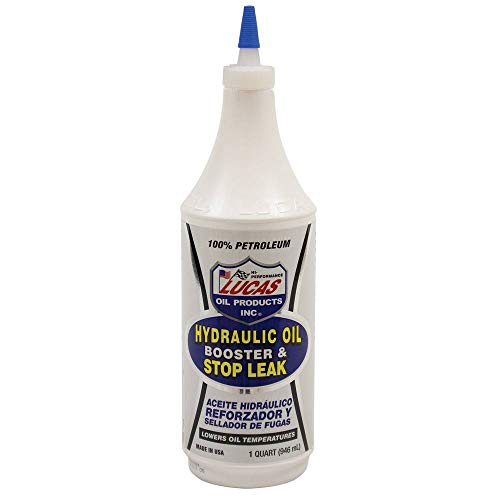Any hydraulic system depends on the quality of the fluid you use. Incompressible liquids allow you to transmit force and effectively lift extremely high weights.
The same principle applies to hydraulic jacks; a common sight in most of our garages and automobile workshops.
While hydraulic jacks are generally maintenance-free. You still have to take care of the oil level and change it periodically for optimum operations.
This is where many beginners struggle as they don’t know which fluid to choose and how to proceed. The following text addresses that.
Basics of a Simple Hydraulic System
The concept of hydraulics is quite simple. Do you remember high school physics? Liquids have some properties that coincide with gasses and solids. One of them is incompressibility.
Liquids are incompressible in nature and flow in the set path with a pressure equal to what’s applied. Hydraulic systems use the same concept of pressure transfer to lift heavier weights with smaller forces.
Take a look at the hydraulic jack. You’ll need to push the level up and down several times to lift your car. However, the force you apply is very small.
This is because hydraulic systems are closed in nature and keep the pressure constant. To lift large weights, the smaller force needs to travel a much larger distance to comply with the laws of physics.
The basic working principle of any hydraulic system is depicted below.
Courtesy: Explainthatstuff
Just like that, there are multiple applications where the force is applied the other way as well. When you use the larger piston to push the smaller ones, the ideal output will be speed.
However, in a majority of hydraulic systems, the smaller piston is used because the ability to lift or sustain large objects with a small force has many applications.
Common characteristics of Hydraulic Fluids
Not every liquid under the sun is suitable for a hydraulic system.
The involved mechanical components are sensitive to certain compounds and some liquids also have properties that make them unsuitable for hydraulic applications.
In general, any good hydraulic fluid will have the following properties.
- Viscosity
- Compressibility
- Frictional resistance
- Thermal stability
- Filterability
- Chemical resistance
- Hydraulic stability
- Seal compatibility
The Importance of Hydraulic Jack Oil
Now it is apparent that the fluid is extremely important for any hydraulic system. No matter how sophisticated your hydraulic system is, it will still require you to regularly change the fluid.
Continuously using the hydraulic jack results in the deterioration of oil levels. There is no time frame for that, the more frequently you use it, the more regularly you’ll need to add the fluid.
That’s why you’ll notice that the hydraulic jack in your home doesn’t need much maintenance. But the one in any automobile workshop will require a regular oil input.
Checking whether you need to change the oil is very simple. All you need to do is to check the gauge showing the fluid level.
You can also notice that it’s time to change the oil if you see a drop in the performance of the jack. Rather than failing abruptly, most hydraulic jacks lose their performance periodically.
The Best Oil Choices for Hydraulic Jacks
Any oil choice that comes with the optimum viscosity levels and the optimum ability to prevent issues like corrosion, oxidation, and wear will be suitable for hydraulic jacks.
In extremely cold environments, there is an additional additive required (Cold Flow), that prevents freezing and allows the jack to operate despite the sub-zero temperatures.
Some of the best hydraulic oils for regular use you can find in the market are:
1. Hapco Hydraulic Oil
A versatile and long-lasting choice that works in almost all regular environments without fail. You’ll never find a better option than Hapco Hydraulic Oil.
Like many top-tier choices in the market, Hapco Oil comes added with special additives to prevent rust and corrosion in the machinery. Whether you use it for a hydraulic jack or any other application, you’ll find it suitable.
2. Sta-Lube Hydraulic and Jack Oil
Looking for a versatile choice that works with all kinds of hydraulic fluids and is suitable for any operating temperature? Then the Sta-Lube Hydraulic and Jack oil is the perfect choice for you.
The premium oil doesn’t require you to empty the oil chamber and directly top-off. The manufacturers have also added several important additives like Anti-foam, and Anti-Rust in this oil.
3. Gunk Liquid Wrench M3332 Hydraulic Oil
If you are someone who likes to keep the garage area clean and free of spills and other hard-to-remove stains, then the M3332 Hydraulic oil and Gunk Liquid is your perfect partner.
The oil comes in an easy-to-use spill-free bottle that allows you to simply pour in the oil at the correct spot and complete the job without any unnecessary mess. Apart from the convenient package, the technical capabilities of this hydraulic oil are also second to none.
The oil comes with inhibitors for oxidation and rust. It also has other essential additives to handle foam and prevent wear.
4. Bar’s Leak Jack Oil
Want an oil that can kill two birds with one stone? The Bar’s Leak Jack Oil is a perfect option for older hydraulic jacks with weak seals and leakage issues. This oil is compatible with almost all hydraulic jack oils out there.
Additionally, it comes with a special feature that allows it to solidify upon contact with air and close off any leakages and other issues without any investment and intricate processes.
5. Lucas Oil 10019 Hydraulic Oil
This is another excellent option that not only improves the overall performance of your hydraulic setup but also stops any leaks or other issues automatically.
The Lucas Oil 10019 is specially designed for brake systems but will also work perfectly with your hydraulic jacks or any other equipment.
For regular users, this is a perfect choice because topping off with it would increase your oil’s life by a factor of 2.
What Types of Fluids Should Not be Used for Hydraulic Jacks?
A lot of people make the mistake of using any type of oil for their hydraulic jacks. However, that can cause a lot of damage if you are not careful. There is a reason hydraulic oils exist, so it is always better to use them instead of looking for other alternatives.
A common question people ask is if they can use the regular motor oil for any hydraulic system. The straight answer is no, absolutely not. We can’t stress this enough, but using motor oil would literally eat away your hydraulic equipment.
Motor oils generally have different kinds of corrosive elements that can dissolve the seals of your hydraulic system and reduce its lifespan.
If you are too adamant about using an alternative, Automatic Transmission Fluid can be a viable option. In most conditions, it can replace hydraulic fluids and does not damage the seals and other internal mechanisms.
However, using the actual fluids specifically designed for hydraulics is still the best course of action.
Step-By-Step Guide on How to Add Oil in a Hydraulic Jack
Adding oil to a hydraulic jack is a very straightforward process. However, beginners might get confused about it and make some mistakes.
Here is a step-by-step breakdown of all the things you need to do to effectively maintain your hydraulic jack.
1. Have The Right Tools
The first thing you’ll need to do is to have all the right tools. You don’t need any specialized tools for the job.
The common things you’ll find in any regular toolbox are enough. Just make sure that you have the following items:
- Oil gun dispenser
- Screwdriver set
- Drain buckets
- Pliers or wrench (In a few cases)
2. Find The Release Valve
Once you have all the required tools, the next step is to find the release valve and open it. Depending on the type of jack you own, you’ll either find the valve in different positions.
3. Remove The Old Oil
The next step is to remove the old oil from the jack. It is always recommended to remove all the old oil and refill it with a new bottle, but you are free to top off if you want. This is not ideal and might affect the efficiency of your hydraulic jack.
However, it can also work without issues in many cases.
4. Inject New Oil Into The Jack
Once all the oil has been drained, the final step is to inject new oil into the jack. You’ll need the oil dispenser for this as it will help you pump the oil in the required place. The process is gradual and will take a few minutes.
5. Close The Release Valve
Once you are done, simply close the release valve and test the performance of your hydraulic jack. You’ll definitely see a noticeable difference.
What Happens If I Don’t Change My Hydraulic Jack’s Oil?
Not changing the oil of your hydraulic jack will obviously affect its operations. You won’t be able to lift items as efficiently and the hydraulic jack might even fail mid-use.
Apart from the loss of performance, you’ll also notice an effect on the longevity of your equipment as well.
The absence of hydraulic fluids builds condensation on the pistons and causes them to rust.
Final Thoughts
A hydraulic jack is an important component for any garage. The equipment is quite versatile and can operate in any condition. The maintenance requirements are also very minimal.
You’ll only need to keep a check on the hydraulic jack oil levels and it’ll last for years.







